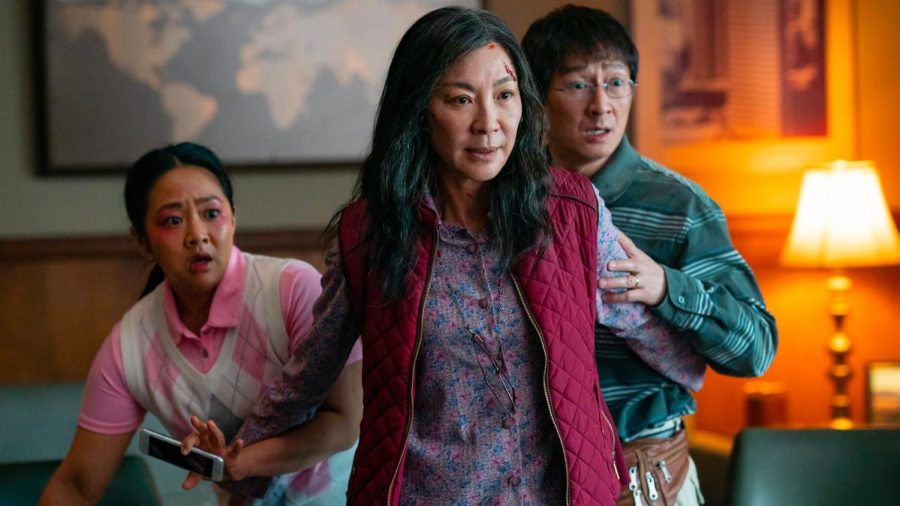The Impact of Everything Everywhere All at Once: Healing Generational Trauma
December 7, 2022
Everything, Everywhere, All at Once is the brainchild of directors Daniel Kwan and Daniel Scheinert, collectively known as Daniels. The film is a hilarious and big-hearted sci-fi action adventure about an exhausted Chinese American woman named Evelyn (portrayed by action film legend Michelle Yeoh), who can’t seem to finish her taxes.
Here is a brief synopsis of the film. Laura Zornosa, writer at the New York Times does a beautiful job of summarizing the Daniels’ masterpiece, “Evelyn Wang (Michelle Yeoh) is a Chinese American immigrant who just wants to host a Chinese New Year party at her family’s failing laundromat, but an alter ego of her husband, Waymond (Ke Huy Quan), arrives to warn her that the multiverse is in danger. So Evelyn learns to “verse jump”, which means to hop between parallel universes to access skills from other versions of herself. She then realizes that the dark force threatening the multiverse is inextricably linked to her estranged daughter, Joy (Stephanie Hsu).”
I remember the first time I watched Everything Everywhere All at Once: it was March, and I was bawling my eyes out in my bed in Buck dormitory. The whirlpool of emotions I felt – grief, acceptance, then catharsis – was extremely powerful. Even though the film focuses heavily on the Sci-Fi “multiverse” aspect of the storyline, I was more drawn to how Evelyn’s stressed relationship with her father translated to familial tension with her daughter and felt empathy for the characters in the film who were affected by generational trauma: how trauma passes down through generations and is immensely difficult to break.
According to Melanie English, “trauma that isn’t just experienced by one person but extends from one generation to the next. It can be silent, covert, and undefined, surfacing through nuances and inadvertently taught or implied throughout someone’s life from an early age onward.” The exploration of the topic in the film made me reevaluate and reflect on my relationship with my own parents. It made me think about “the immigrant mentality” – how pressure from immigrant parents to “do well” and “be better” than them – stems from a place of high stress from leaving their culture and country of origin behind to find a better life in the United States. Many immigrants regret that they were unable to pursue their dreams and achieve the hopes that their parents had for them; therefore, they set these aspirations on their own children, in hopes that they can one day achieve “the American Dream”. However, this mindset falls to pieces when children of immigrants decide not to follow their parents’ expectations and decide to forge their own path instead. On occasion, I blame conflicts with my parents on them not being able to see from my perspective, but I learned to take a step back and to see my parents as individuals growing up under different circumstances – I reflected on where the source of their pressure on me comes from. After taking an active step to see them as individuals, I navigate my interactions with them and resolve conflicts with them in an alternative way.
Even though Everything Everywhere All at Once may not be the easiest film to digest, I highly recommend watching it. The way generational trauma is represented in the film is the most powerful commentary I have seen in recent media.
References
https://www.health.com/condition/ptsd/generational-trauma
https://www.nytimes.com/2022/04/15/movies/everything-everywhere-all-at-once-interviews.html


